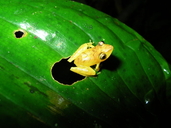Biology:Pristimantis caryophyllaceus
| Pristimantis caryophyllaceus | |
|---|---|

| |
| Scientific classification | |
| Domain: | Eukaryota |
| Kingdom: | Animalia |
| Phylum: | Chordata |
| Class: | Amphibia |
| Order: | Anura |
| Family: | Strabomantidae |
| Genus: | Pristimantis |
| Species: | P. caryophyllaceus
|
| Binomial name | |
| Pristimantis caryophyllaceus (Barbour, 1928)
| |
| Synonyms[2] | |
| |
Pristimantis caryophyllaceus is a species of frog in the family Strabomantidae. It is found in Costa Rica and Panama; records from Colombia prior to 2010 refer to Pristimantis educatoris.[2] However, taxonomy of Pristimantis caryophyllaceus and P. educatoris remain unsettled, and many sources continue to report Pristimantis caryophyllaceus from Colombia.[1][3][4][5]
Pristimantis caryophyllaceus is sometimes known as the La Loma robber frog,[1][2][4] after La Loma, its type locality on the trail between Chiriquicito and Boquete, in the Bocas del Toro Province of Panama.[2]
Description
Males grow to 24 mm (0.94 in) and females to 26 mm (1.0 in) in snout–vent length. Tympanum is not clearly visible. Dorsal colouration is highly variable: yellow, pinkish, brownish, greyish, or dark green. There are always distinct darker spots on the dorsal surface, in some individuals extending into dark crossbars. The ventral surface is white, sometimes with some dark pigmentation.[4]
Reproduction
Eggs are laid on leaves[1][4] or on the ground.[5] Females brood the eggs, covering them with their bodies.[1][4]
Habitat and conservation
The species' natural habitats are primary lowland moist and wet forest, premontane wet forests, and rainforests. They occur in the leaf-litter and low vegetation,[1] and also in bromeliads.[5] They are nocturnal.[5]
Pristimantis caryophyllaceus is threatened by habitat loss and possibly chytridiomycosis. It has disappeared from lowland areas of Costa Rica, but remains common in some areas and appears to have been recovering others.[1]
References
- ↑ 1.0 1.1 1.2 1.3 1.4 1.5 1.6 IUCN SSC Amphibian Specialist Group (2020). "Pristimantis caryophyllaceus". IUCN Red List of Threatened Species 2020: e.T56497A3040836. doi:10.2305/IUCN.UK.2020-3.RLTS.T56497A3040836.en. https://www.iucnredlist.org/species/56497/3040836. Retrieved 17 November 2021.
- ↑ 2.0 2.1 2.2 2.3 Frost, Darrel R. (2022). "Pristimantis caryophyllaceus (Barbour, 1928)". Amphibian Species of the World: An Online Reference. Version 6.1. American Museum of Natural History. doi:10.5531/db.vz.0001. https://amphibiansoftheworld.amnh.org/Amphibia/Anura/Brachycephaloidea/Strabomantidae/Pristimantinae/Pristimantis/Pristimantis-caryophyllaceus.
- ↑ Acosta Galvis, A. R. (2021). "Pristimantis caryophyllaceus (Barbour, 1928)". Lista de los Anfibios de Colombia: Referencia en linea V.11.2021. https://www.batrachia.com/orden-anura/craugastoridae-263-spp/pristimantis-caryophyllaceus/.
- ↑ 4.0 4.1 4.2 4.3 4.4 "Pristimantis caryophyllaceus". Amphibians of Panama. Smithsonian Tropical Research Institute. http://biogeodb.stri.si.edu/amphibians/en/species/173. Retrieved 6 June 2015.
- ↑ 5.0 5.1 5.2 5.3 Luis Humberto Elizondo C.; Federico Bolaños V. (2011). "Pristimantis caryophyllaceus". Biodiversity of Costa Rica. Santo Domingo de Heredia, Costa Rica: Instituto Nacional de Biodiversidad. http://www.crbio.cr:8080/neoportal-web/species/Pristimantis%20caryophyllaceus. Retrieved 29 January 2021.
Wikidata ☰ Q4456780 entry
 |


